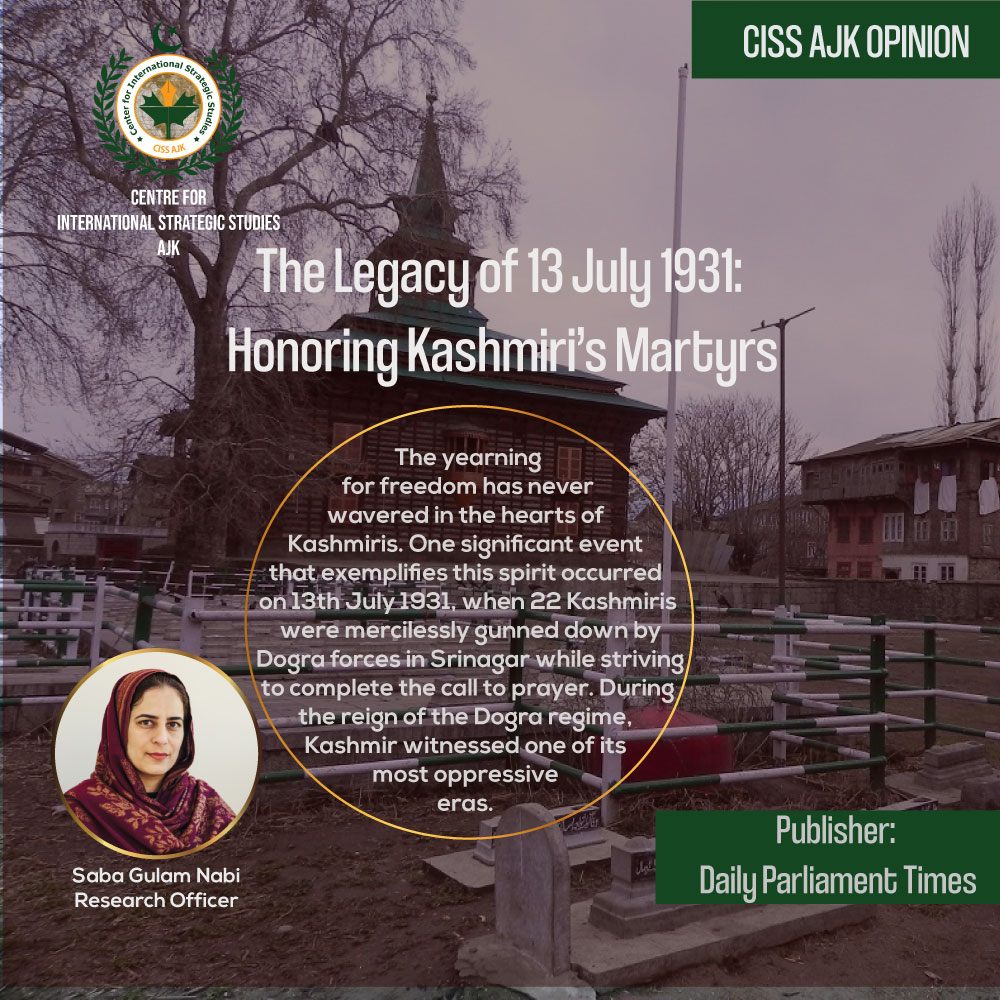780
The history of Kashmir bears witness to countless sacrifices made by its people. Kashmiris have consistently demonstrated their unwavering commitment to their rights and dignity, showing no hesitation in sacrificing their lives and the lives of their loved ones. Throughout history, they have endured oppression at the hands of rulers and occupiers of Kashmir, from the invasion of the Mughals to the present-day rule of the Modi regime. Despite this, the yearning for freedom has never wavered in the hearts of Kashmiris. One significant event that exemplifies this spirit occurred on 13th July 1931, when 22 Kashmiris were mercilessly gunned down by Dogra forces in Srinagar while striving to complete the call to prayer. During the reign of the Dogra regime, Kashmir witnessed one of its most oppressive eras. Maharaja Hari Singh, who ascended to the throne in 1920, had initially been hoped to govern wisely due to his education and enlightenment. However, he continued the policies of his predecessors, imposing burdensome taxes, restricting religious practices on Muslim subjects, and subjecting the Muslim community to discrimination. Meanwhile, political awareness among Kashmiris was on the rise. In 1930 and 1931, incidents of blasphemy took place in Jammu and Kashmir, which deeply offended the tolerant Muslim population. In Srinagar, Muslims organized a protest procession. Amidst the gathering, a young man named Abdul Qadeer Khan took the stage and delivered a scathing speech against the rule of the Maharaja. He was subsequently arrested and put on trial, prompting Kashmiris to demand an open hearing a request that was denied by the Maharaja’s government. On the day of the trial, Kashmiris gathered outside the jail. When the time for the Zuhr prayer arrived, one individual began the Azan (call to prayer). The police of the Maharaja opened fire, killing the individual. Undeterred, another person took his place and continued the Azan, only to meet the same fate. This cycle repeated until 22 Kashmiris had been shot dead. This tragic incident marked a turning point in the political landscape of Jammu and Kashmir, shaping the mood and nature of Kashmiri politics. According to Sheikh Abdullah, as described in his book, “Aatish e Chinar,” “the news of the incident spread like wildfire across the Kashmir Valley. Abdullah hurried to the location and found one injured person still alive. Upon reaching him, the dying man uttered, “Sheikh Sb, we have fulfilled our duty; now its your turn”. Grieving Muslims carried the martyrs bodies to the Jammia Masjid in Srinagar and launched protests against the government. Prominent leaders of Jammu and Kashmir were arrested and imprisoned. It was at this point that Muslims began contemplating the formation of their own political party and embracing a democratic path to free themselves from the oppressive rule of the Maharaja. Thus, the enraged Muslims established the political party “Muslim Conference.” Prior to the formation of this party, smaller groups of like-minded individuals had been working towards creating awareness and safeguarding rights, but there was no structured political party representing Kashmiri Muslims or the larger Kashmiri populace at that time. The struggle of Kashmiris, which commenced on that fateful day, has persevered and grown stronger over time. Despite facing numerous instances of violence and carnage since 1931, the resilience and spirit of the Kashmiri people have remained unwavering. Each tragic event has only served to fuel their determination, fortifying their resolve in the pursuit of justice, freedom, and self-determination. The unwavering spirit of the Kashmiris continues to be a source of inspiration and atestament to their unwavering commitment to securing a better future for themselves and their land. Unfortunately, the fate of Kashmiris remains unchanged. The Modi regime has controversially integrated a portion of Kashmir into India through an illegal process. In the illegally occupied region, Kashmiris are deprived of their voice and are not allowed to raise their concerns on international platforms or any other forum. Their voices are suppressed through the use of force, including guns, explosives, and other coercive tactics. The United Nations has been unable to implement its resolutions or effectively intervene to prevent the loss of innocent lives in Kashmir. Disturbingly, international observers have issued warnings of a potential humanitarian crisis resembling the tragic genocide in Rwanda if the situation is not addressed in Kashmir. These challenges highlight the on-going struggle faced by the Kashmiri people and the urgent need for a just and peaceful resolution to protect their rights and ensure their well-being.



